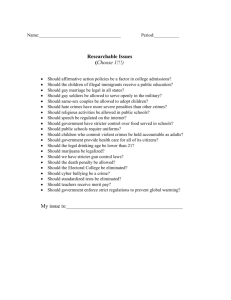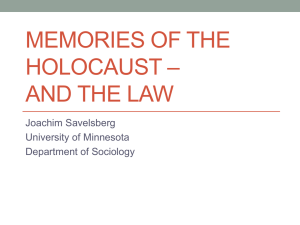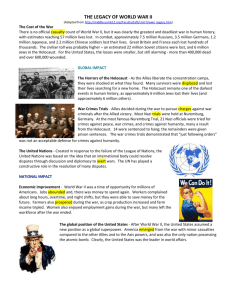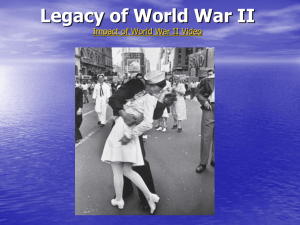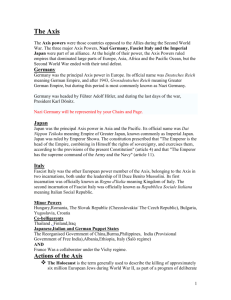International Courts/International Law
advertisement
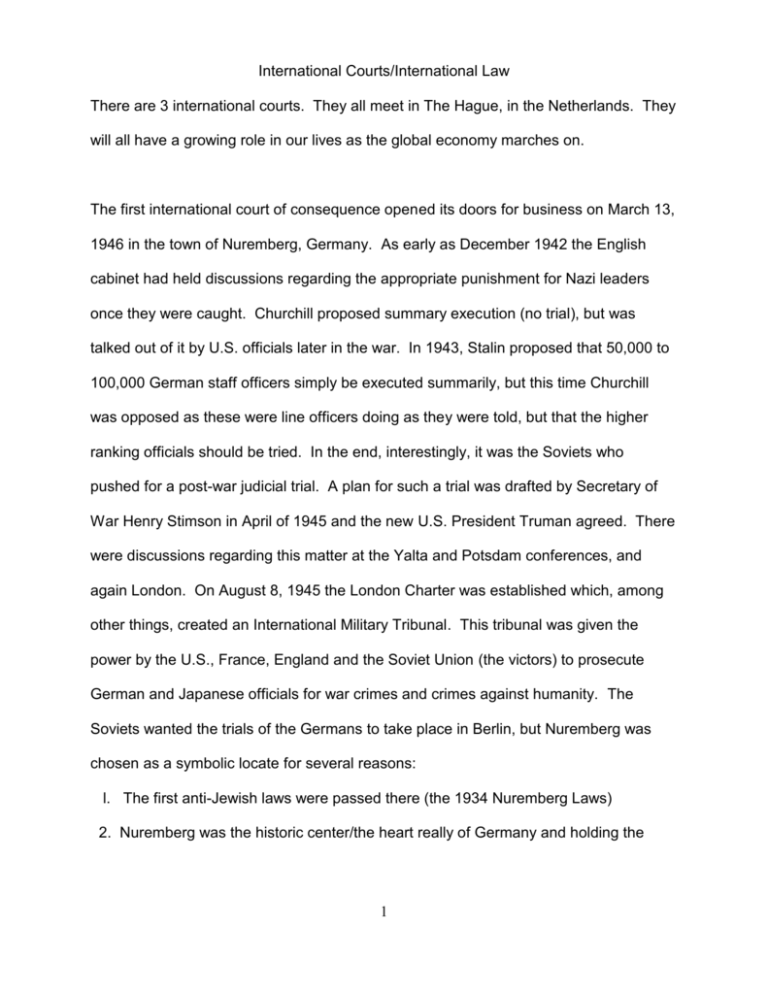
International Courts/International Law There are 3 international courts. They all meet in The Hague, in the Netherlands. They will all have a growing role in our lives as the global economy marches on. The first international court of consequence opened its doors for business on March 13, 1946 in the town of Nuremberg, Germany. As early as December 1942 the English cabinet had held discussions regarding the appropriate punishment for Nazi leaders once they were caught. Churchill proposed summary execution (no trial), but was talked out of it by U.S. officials later in the war. In 1943, Stalin proposed that 50,000 to 100,000 German staff officers simply be executed summarily, but this time Churchill was opposed as these were line officers doing as they were told, but that the higher ranking officials should be tried. In the end, interestingly, it was the Soviets who pushed for a post-war judicial trial. A plan for such a trial was drafted by Secretary of War Henry Stimson in April of 1945 and the new U.S. President Truman agreed. There were discussions regarding this matter at the Yalta and Potsdam conferences, and again London. On August 8, 1945 the London Charter was established which, among other things, created an International Military Tribunal. This tribunal was given the power by the U.S., France, England and the Soviet Union (the victors) to prosecute German and Japanese officials for war crimes and crimes against humanity. The Soviets wanted the trials of the Germans to take place in Berlin, but Nuremberg was chosen as a symbolic locate for several reasons: l. The first anti-Jewish laws were passed there (the 1934 Nuremberg Laws) 2. Nuremberg was the historic center/the heart really of Germany and holding the 1 trials there had the symbolic value of dominance and ascendency. 3. Nuremberg was the center of the early Nazi movement (after the Munich Putch, Hitler came to Nuremberg to re-start his movement) and it was the site of many Nazi rallys. 4. Finally pragmatic, as Nuremberg had one of the few standing courthouses left in all of Germany There was a compromise however as the International Military Tribunal opened initial proceedings in Berlin on October 18, 1945, and then moved proceedings to Nuremberg. The initial hearing resulted in the indictment of 24 major war criminals and 6 criminal organizations. The Nuremberg proceedings began in November of 1945. One individual managed to commit suicide before the trials began and another was found medically unfit, so the Nuremberg Trials as they are known in the popular press involved 22 cases. 19 of the men were found guilty and 2 were acquitted. 12 were hung (on 10/16/46), 3 got life, 4 got between 10 and 20 years, and one (Herman Goring) committed suicide the day before the hangings were to be carried out. What is often overlooked is that over the course of the ensuing 3 years, some 200 others were also tried in Nuremberg as war criminals, and another 1,600 were tried under traditional channels of military justice. The trial and execution German leaders raised serious legal problems regarding crime and criminal law. I would suggest that the Nuremberg trials were little more than a veneer for vengeance – Victor’s Justice. There was no judicial basis for the proceedings whatsoever. It was used as a civilized means of killing our enemies. We 2 soothed our conscience that we proceeded legally before killing rather than simply killing in cold blood. Some of the legal problems: l. The International Military Tribunal operated without legal precedent, as it was formed by the victors to punish the vanquished. If Germany had won, one can assume that the German military system would have charged U.S. and British leaders with similar offenses. 2. The trials were military trials, not civilian trials, and they did not follow civilian law. 3. The International Military Tribunal served as a source of new law (legislative) as we as prosecutor, judge and jury (judicial), and executioner (executive). It did not adhere to the democratic ideals of separation of powers/balance of powers 4. The International Military Tribunal created law after the fact, that is, for acts that occurred before the law was stated. The is ex post facto law, which violated the principle of legality as found in nullum crimen sine lege. 5. The Nuremberg trials violated German sovereignty. 6. The war crime trials found persons guilty of acts committed while carrying out the orders of the superiors. There was not intent per se, but rather obedience. This is knows as the Superior Order defense. Is a soldier guilty of a war crime or a crime against humanity if they kill another human being on orders from a superior officer? A soldier is trained to kill and must obey an order from a superior officer or is subject to disciplinary action through a court martial would could result in their execution. A soldier is thus put into a Catch-22 situation. If they obey the order and are subsequently captured, they could face execution as a war criminal. If they soldier 3 refuses to obey the initial order, they could be court marshaled as executed by their own troops. The Nuremberg defendants raised the Superior Order defense, but the military tribunal ruled that a superior order does not relieve a soldier of legal responsibility under international law if a legal and moral choice was possible. But, how does a soldier know if an order is legal, and how does legality enter in? It was legal to kill Jews in Hitler=s Germany. It was legal to kill Native American=s in the U.S. An assumption was made in Nuremberg that individuals have an innate sense of what is right and legal (that transcends learning and conditioning), but from a psychological point of view, a soldier is conditioned to obey, without question. These matters were simply never address by the Nuremberg court and frankly remain a point of contention within the War Crimes Tribunals to this day. The Nuremberg Trials were based on the somewhat tenuous notion of international law, not on the traditional concept of state sovereignty. The law that was applied was done so in an ex post facto context. The defendants did not need to possess mens rea. The Nuremberg trials procedurally violated basic principles of Western criminal law. Substantively, the men did despicable things, but the entire Nuremberg affair were equally despicable in a procedural context, and the West substituted power for principle, a sanctimonious fraud undertaken to suit the passion and clamor of the times. It was not much more than a high-grade lynching party (paraphrased from the comments of U.S. Supreme Court Justices Harlan Stone and William Douglas). Nuremberg was a mask for retribution. It was merely a case of victors justice - victor=s justice is an attempt by the victor to institute a scheme of justice by which the actions, 4 policies, and participants of the losing side may be judged and punished with a veneer of propriety. Some have called it camouflaged retribution. Interestingly, while Nuremberg attempted to establish the fact that a Arule of law@ should always prevail, the failure of the global community to respond to all war crime/crimes against peace/crimes against humanity violations suggests a decidedly uneven distribution of justice and the rule of law. Until all that violate international law are brought before some kind of international tribunal, it is a mockery, a case of victor=s justice. In a similar vein, the fact that international justice is frequently not pursued when aggressors are leading powerful states also highlights the hypocrisy of it all. In a more positive tone, in the aftermath of the Nuremberg trials, the United Nations (created 10/24/45) began to discuss the need to establish some aspects of international law. As a result of the Nuremberg trials, several international conventions were forthcoming: l. Genocide Convention (1948) 2. Universal Declaration of Human Rights (1948) 3. Convention on the Abolition of the Statute of Limitation on War Crime and Crimes Against Humanity (1968) 4. The Geneva Convention on the Laws and Customs of War (1949) In addition in the aftermath of the Nurenberg trials, the United Nations also began to discuss the need to create some kind of permanent international tribunal. The idea of a world court and international law in general was first hammered out by Hugo Grotius in 1625 in his book, De Jure Belli ac Pacis. He noted then, as we note to this day, that 5 international law is custom, tradition and common consent rather than hard and definitive substantive code. Secondly, as we also noted today, he was concerned about the fact that a world court would lack any mechanism to enforce its rulings. Despite these problems, the United Nations moved forward, drawing upon the experiences of the League of Nations and the looming Nuremberg situation, and established the International Court of Justice, or what we call the World Court in 1945. Two footnote thoughts: 1. The League of Nations had created a Court of International Justice that met from 1921 to 1939, but it was truly toothless. 2. In the end, perhaps the Nuremberg Trials served as a somewhat flawed but important first step forward in extending principles of law and concepts of equity and justice into a new era, a globalized era and international era. Social progress tends to come in asymmetric stops and starts with much injustice along the way. As much as it pains me to say it, for I see so much that was wrong with the Nuremberg Trials, in sum, they clearly did serve as the scaffolding upon which international law of all kinds is being built. There was a silver lining. The International Court of Justice (the World Court) first set in 1946, and as noted a moment ago, meets in The Hague, in the Netherlands. It is financed by the United Nations and is the judicial arm of that entity. There are 15 judges elected to 9 year terms by the U.N. General Assembly. These judges act as independent magistrates and do not represent their governments. Judges deliberate in secret, and render their 6 verdicts in open court, with majority opinions and dissenting opinions coming forth. The court’s judgment is final – there are no appeals. Since 1946, the World Court has dealt with roughly cases, delivered judgements on disputes, and issued roughly advisory opinions. The U.S. does have a representative on the bench [NOTE – U.S. 1790s parallel of Aglobalization@ in that era (commerce between Virginia and Vermont - tobacco for maple syrup) and globalization today. Some sovereignty concerns, then and now (Jefferson not like the idea of a U.S. federal Supreme Court)] In some ways, it is still largely a symbolic and ceremonial entity, and is used primarily to sway public opinion and allow for international diplomatic positioning and posturing, though there is evidence that the Court is gaining in stature of late. The World Court, like other courts, is an evolving entity that seems poised to become a force of some significance in the 21st century. The real problem is to try and establish/clarify/articulate points of international law. At this juncture, the World court defines international law as principles reflected in international conventions, international customs, general principles of law recognized by civilized nations, judicial decisions, and writing of the most highly qualified experts on international law. It has been dealing with this matter since 1947 when, again in the aftermath of the Nuremberg trials, the U.N. began to try and codify AOffenses Against Peace and Security of Mankind.@ The original draft was completed in 1954, and it has been modified and debated, and debated and modified ever since. As of this writing, there are now 22 recognized international crimes. While originally focusing on war 7 crimes and crimes against humanity, the list has been expanded to include other things now: genocide war crimes aggression (crimes against peace) crimes against humanity unlawful use of weapons/unlawful emplacement of weapons racial discrimination and apartheid slavery and related crimes torture unlawful medical experimentation piracy aircraft hijacking threat and use of force against internationally protected persons taking of civilian hostages drug offenses international traffic in obscene publications destruction and/or theft of national treasures environmental protection theft of nuclear materials unlawful use of the mails interference with submarine cables falsification and counterfeiting bribery of foreign public officials I do wish to divert the discussion for a moment and raise really two issues: 1. Should those involved in these kind of ventures be charged with a crime? Should those involved be shielded from liability by the law of their land? It was legal, after all, to kill Jews in Germany in the WWII era. It was legal to kill Indians in America for many years. It was legal to kill Moslems in the Philippines in the 1970s. How can you charge someone with a Acrime@ when they are engaging in activities that are substantively legal within the sovereign realm in which they reside? This is one of the damning fundamental question facing those who wish to develop the concept of international law and a world court. 8 2. The other major problem is the enforcement problem. If international law is ever to be enforced, it will ultimately be enforced by a nation, at least until there is an enforcement arm of the UN. The major difference between domestic criminal law and international law is that in the case of international law there is no enforcement machinery. On the other hand, that is not totally true. The great achilles heel of domestic courts is that they lack enforcement powers. Nine old men told U.S. President Nixon to turn over the Watergate tapes in 1975. What were they going to do if he didn=t...walk down Pennsylvania Ave., push their way past the 2 million soldiers that Nixon had at his command and get the tapes. In the end, Nixon turned over the tapes because of the traditional power of the court, the traditional acceptance by the public of their power. The ultimate power of the court is their ability to get people to do what they say. To do so, they must be cognizant of public opinion and not rule outside, what Barnard calls, the zone of indifference. Constant ruling outside that zone will erode public confidence in the court, and their rulings will go unheeded. Back to the list of 22 international crimes and the World Court - the more serious crimes (war crimes, crimes against peace, crimes against humanity) have been assigned to the International Criminal Court, or what we in slang we call the War Crimes Tribunal. Despite this auspicious list of 22 offenses, in a practical sense, the World Court deals with legal disputes between member states, and provides advisory opinions on legal question submitted by the U.N. General Assembly, as well as other international organs and agencies. 9 In addition to the World Court which deals with criminal matters, there are two other international courts that also meet in the Hague, the most visible being the entity we just made reference to, International Criminal Court (ICC), or what is generally known as the War Crimes Tribunal. Substantively, the International Criminal Court is really more of the child of the Nuremberg Trials than the World Court. The ICC handles war crime-type cases in situations where the accused is a national or state official and the suspects’ national court is not willing/unable to prosecute. The ICC looks primarily at crimes against peace, crimes against humanity (which includes genocide), and war crimes, and considers them in the broad context of crimes committed by the state: War crimes - Acts of violence against civilian populations or prisoners of war by military personnel in violation of the laws and customs of war, not justified by military necessity; Acts involving weapons or military methods of unusual cruelty or devastation. Violence is the nature of warfare, though it is generally recognized that violence should be limited to military personnel and military targets. Examples - American bombing of Dresden during WWII; German V1 and V2 rocket attacks; American atomic bomb attacks on Japan. Crime Against Peace/Crimes of Aggression - Acts based on the distinction between offensive and defensive warfare. Offensive wars are illegal, but wars in defense of one=s country and sovereignty are considered legal. Examples Soviet invasion of Afghanistan; American invasion of Panama; Nazi invasion of Poland; Iraq invasion of Kuwait, Japanese invasion of China. Crime Against Humanity - Acts that violate concepts of natural law and natural 10 rights of human beings as human beings. Genocide (the deliberate extermination of one class, race, or religious group by another) is listed separately, but is often considered a component of this category. Examples Serbian purge of Bosnia; Jewish holocaust of WWII; Turkish genocide of Armenians in WWI; Iraq purge of Kurds; American internment of Japanese during WWII; Rwanda Hutu and Tutsi genocides, Rape of Nanking, the Holodomor. Prosecution of war crimes can be handled by the World Court (the International Court of Justice), but it is the ICC that generally takes these war crime-type cases. Do note that: a. The ICC can deal with other violations, though generally only if they are part of a larger war crimes picture. b. There have been a number of temporary war crimes tribunals that have examined war crimes over the years (Nuremberg court that convened after WWII; Tokyo Trials also after WWII; Yugoslavia due to expire 2010; Rowanda suppose to expire 2010 but will likely continue). 1. International Criminal Tribunal - Yugoslavia: Established in May of 1993, its work should be done by 2010. This is an entity of the United Nations. It has examined allegations of genocide, crimes against humanity, and crimes against laws and customs of war with respect to the Yugoslavian situation in the 1990s. As of this writing, there have been 161 indictments, 100 trials completed, 26 underway, and the rest in various stages. There are 16 judges and a staff of some 1,200 11 people involved with this Court. 2. International Criminal Tribunal - Rwanda: Established in November of 1994, its work is scheduled to be done by 2010 but will probably have to be extended. This is an entity of the United Nations. It has examined allegations of genocide, crimes against humanity, and crimes against laws and customs of war with respect to the Hutu and Tutsi uprisings in Rwanda in the 1990s. There have been 21 trials to date, 11 trials are underway and 14 cases in earlier stages of processing. Seeing the need for a permanent court of this nature, the U.N. began to formulate such a body in the 1990s, and utilized the Rome Statute of the International Criminal Court as the founding treaty. The Rome treaty was formally approved by the U.N. in July of l998 by a vote of 120 to 7 (7 opponents were China, Iraq, Yemen, Qatar, Libya, Israel, U.S.), and was ratified by enough nations (60) in April of 2002 so that it officially began operations July 1, 2002 and court began in March of 2003. As of , 105 countries have formally signed on as participating members of the court (99 of which are active members of the Assembly of State Parties as of ), and 41 have not formally signed but have ratified the founding Rome treaty. The International Criminal Court is now a free standing body with no formal organizational or financial ties to the United Nations. The Assembly of State Parties (nations who are a party of this court) serves as the overall governing body. Each country receives one vote. There are 18 judges who serve 9 year terms, 6 assigned to pre-trial matters, 6 to the trial component, and 6 to the appellate division. They are elected to the Court by the 12 Assembly of State Parties, as is the Chief Prosecutor who also serves one, 9-year term. The current Chief Prosecutor is Serge Brammertz, Belgian, who is serving a term from 2007 - 2016. There is a staff of 485 persons and the headquarters are in The Hague, but they can hold trial anywhere in the world. A trust fund has been established to make reparations to victims and families. As of July 2007 there were 7 trails underway involving 25 persons. To date, the Court has dealt with situations in four countries, Darfur/Sudan, Central African Republic, North Uganda, Democratic Republic of the Congo. This body is struggling with definitions - what is a war crime, a crime against peace, a crime against humanity. Another issue is where individuals can be arrested, and in a broader sense, where can they be tried if they don=t come to this court. The latest notion is the Princeton Principle of Universal Jurisdiction. No matter where the offense was committed, fugitives accused of war crimes, crimes against peace and crimes against humanity should be liable for trial in the courts of the country where they are found. This is counter of course to the principle of Territorialty. So, former Chilean Dictator Pinochet, who fled Chile for England, should be able to be arrested and tried in England for the crimes against humanity that he committed in Chile, or, arrested in England and turned over to the ICC. He died before the matter could be resolved. Several footnote thoughts: 1. Obviously it is a crime in the U.S. for adults to engage in sexual activities with minors, but, the legal principle of extra-territoriality says that American citizens could go to other countries (Thailand, Cambodia) and engage in sexual activity of this nature 13 there. They would face possible legal sanctions in Cambodia or Thailand, but not here in the U.S. since they committed the offense external to our sovereign territory, ie., if you are caught speeding in Germany, you could not be charged with speeding in the United States; if you were caught speeding in Florida you could not be charged with speeding in Nebraska. All that changed with respect to child sexual abuse in April of 2003 when Congress passed the Protect Act. This Act allows American federal prosecutors (note – not state but federal) to charge American citizens with sex crimes against minors committed on foreign soil. The idea is that in reality, no such charges would ever be filed in Cambodia or Thailand, and that the only way to start to shut down this substantively despicable international child sex trade (involving 1.8 million children include 1 million in Southeast Asia), is to get the developed nations to adjust its longstanding procedural extra-territoriality position, and start prosecuting in this extraterritoriality fashion – to have the laws of a country apply outside of its borders. a. Should the laws of a country apply outside of its borders? b. If so, which laws should apply in an extra-territorial sense? c. Should the extra-territoriality principle apply only to citizens (ie., the U.S. can prosecute its own citizens who engage in child sexual abuse outside of U.S. borders) or can non-citizens be prosecuted as well (a Canadian can be prosecuted in the U.S. for child sexual abuse while in Thailand). The Princeton Principle of Universal Jurisdiction says the latter. I don’t believe this will stand up in Court. To date, only one person has been charged under the child sexual abuse provision (30 year imprisonment max), and it is a particularly grievous case (the Feds were waiting to charge someone who is really bad 14 so that they could use it as a test case – Michael Clark who was arrested in 2003 (age 69 at the time). He allegedly traveled overseas regularly to have sex with young boys in Southeast Asia (USA Today, 9/25/03). One conviction to date under this act, but that was for the possession of virtual child porn (Dwight Whorley of West Virginia). Appellate Court upheld convictions (12/08), but did so in a way that was an apparent contradiction with a previous Supreme Court ruling and thus it will likely not stand. Again, per above, I ask what other acts should also come under this extra-territoriality exemption? In this case, Congress ignored procedural standards of basic Constitution law/Western law due to the substantive stench of the behavior. 2. President Clinton signed a treaty enjoining the U.S. with the ICC in 1998, but Bush withdrew U.S. support and sought to undercut its power over U.S. citizens. The United States have been reluctant to sign on as a member-state of the International Criminal Court because many of its actions would be called into question. Consider the case of Vietnam where from 1965 to 1974 the U.S. forces killed at least half a million Vietnamese citizens. In response a non-governmental International War Crimes Tribunal (sometimes called the Russell Tribunal) was convened in Copenhagen in 1966 and again in 1967 in Stockholm. The Tribunal concluded that the U.S. had engaged in serious acts of aggression against Vietnam in violation of international law and that the U.S. was guilty of deliberate and systematic bombardment of civilian targets. The U.S., of course, continued to function with complete impunity, as it did in Panama and Granada and in Iraq. The development of a true international court has been hindered because leading states engage in bullying immunity tactics and operate above the law 15 simply because they can. The failure of the international community to respond equally to all contemporary violations of international law reveals that the notion of international criminal law has yet to fully evolve. If geo-political forces continue to determine which offenders will be prosecuted, then international criminal law is destined to be a substantive fantasy. Until all that violate the law are brought before it, the international community must face the realization that global victimization cannot elicit commensurate universal jurisprudence (see generally, L. Friedman AWar Crimes,@ in S. H. Kadish (ed) Encyclopedia of Crime and Justice, New York, Free Press, 1983, p. 1645). 3. In a similar vein, I should point out that the U.S. is a vocal opponent of the ICC due ostensibly to sovereignty concerns. But that is just a guise or a ruse, floated about to obscure the real issue. The fundamental concern is that the U.S. wishes to move and function as it pleases; it wishes to avoid international scrutiny; it wishes to operate with impunity and immunity. In other words, we want to do what we want to do without other nations telling us we can’t. We want to act with no repercussions or liabilities. The paradox, the hypocrisy in this scenario is that we at the same time reserve the right to tell other nations what they can and cannot do, and threaten to respond/prosecute accordingly, with rather significant repercussions and liabilities forthcoming from us (Nuremberg Trials, Tokyo Trial, Noriega episode, Iraq, Afghanistan, Vietnam, countless trade embargos and economic sanctions), rather than from an international body. Since we now have the big stick and are the world power at present, we can operate above the law, independent of the law. We wish to be a law unto ourselves, to establish and adjust our own morality and legality as it suits us, without external/international review. The fact that we simultaneously tout and flaunt the rule of 16 law and yet still hold ourselves up as an ensign to all nations reeks with the stench, with an extreme stench, of self-righteous certitude and hypocrisy, and is extremely troublesome. 4. One of the interesting features that has arisen from the defense teams that have appeared in the War Crimes Tribunal has been the use of creative language in the court, and the argument that their behavior was not criminal per se, that they did not kill, that they merely neutralized. There has been the growth of what psychologists and sociologists call euphemistic labeling - activities are sanitized via clean terminology. We talk of Afinal solutions,@ Aneutralizing someone,@ Aresponding with extreme prejudice (the CIA term for killing someone),@ we tend to de-humanize the whole experience and give it some kind of, again, sanitized label which allows us to become morally disengaged from the event, it allows us to put some moral distance between ourselves and act. What we are talking about is death, destruction, atrocious acts of incommunicable horror. By using clean terms, the deplorable acts do not seem quite as atrocious, and we then successfully disengage ourselves, morally and ethically, from the horrific acts. Another very common psychological response to charges arising in the ICC has been, what psychologists call, advantageous comparison, which uses events from the past to make the current event seem morally justifiable. In addition to these points, I would also reinforces the Synanon experience, as also articulated by Bandura… AThe overall findings from research (is that human atrocities) require conducive social conditions rather than monstrous people to produce heinous deeds. Given appropriate social conditions, decent, ordinary people can be led to do extraordinarily cruel things.@ (see, Albert Bandura AMechanisms of Moral 17 Disengagement,@ in W. Reich (ed) Origins of Terrorism, Cambridge MA: Cambridge University Press, 1990, pp. 161-191. This cite on page182). The third and last international court is the Permanent Court of Arbitration. This is the oldest institution for international dispute resolution. It is not tied to the United Nations. It was established in 1899 during the Hague Peace Conference. The Court sits in the Hague, and there are now 107 countries part of this Convention. The PCA is not a Acourt@ in the conventional understanding of that term, but an administrative organization with the object of having means available to assist in international arbitration and commissions of inquiry and conciliation. The PCA provides services for the resolution of disputes involving various combinations of states, state entities, intergovernmental organizations, and private parties. The PCA administers cases arising out of international treaties (including bilateral and multilateral investment treaties), disputes over territorial and maritime boundaries, sovereignty, human rights, international investment (investor-state arbitrations), and matters concerning international and regional trade. Hearings are rarely open to the public and sometimes even the decision itself is kept confidential at the request of the parties. The focus tends to be in the realm of civil law. As with the other World Courts, this court too has no power to enforce their rulings other than the willingness of those involved to do as they have been so ordered; societal expectation, public pressure and acquiescence, very much akin to U.S. courts 18 as they marched to power in the last 200 years; is a desire in the international business community to bring some stability into the global markets so they are pushing for this as well, even if they lose a case or two in the short run, they see a decided long-term advantage. (see generally Day and Reilly, Journal of CJ Education, 10/0) (International Courts1.doc 395 folder) 19
